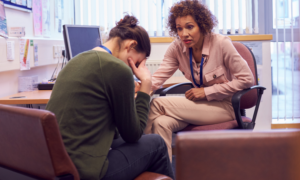Author(s): Commissioned by the World Health Organization and UNICEF
Published: February 2020
Report Intro/Brief:
“Despite dramatic improvements in survival, nutrition, and education over recent decades, today’s children face an uncertain future. Climate change, ecological degradation, migrating populations, conflict, pervasive inequalities, and predatory commercial practices threaten the health and future of children in every country. In 2015, the world’s countries agreed on the Sustainable Development Goals (SDGs), yet nearly 5 years later, few countries have recorded much progress towards achieving them. This Commission presents the case for placing children, aged 0–18 years, at the centre of the SDGs: at the heart of the concept of sustainability and our shared human endeavour. Governments must harness coalitions across sectors to overcome ecological and commercial pressures to ensure children receive their rights and entitlements now and a liveable planet in the years to come…
We live in an era like no other. Our children face a future of great opportunity, but they stand on the precipice of a climate crisis. Working together, the world’s countries have agreed to the SDG framework to usher future generations into a cleaner, healthier world, but the SDG agenda has yet to gain traction. Our challenge is great and we seem to be paralysed.
This Commission proposes a new global movement to place children at the centre of the SDGs. The CRC is the world’s most ratified human rights treaty, showing the power of children to unite us for the common good. Working to improve children’s health and wellbeing can motivate all of us to save our planet for them and for ourselves.
In this Commission, we have purposefully taken a high-level view of the problem of child health and wellbeing. First, we have argued for a life course and intergenerational approach to show that the benefits of intervening to improve child health and wellbeing are multiplied many times over the life of the child and their descendants. The economic and ethical case is unbeatable. We also show how all sectors are responsible for children and lay out an agenda to unite them to work together.
Second, we operationalised this agenda by summarising a set of entitlements for children that have already been agreed upon by the world’s countries. We have also described how families, communities, and governments can mobilise to deliver them. The effort required is enormous, but if we cannot deliver for our children, what is the measure of our civilisation?
Third, such an enormous collective project requires governance. We have laid out the changes to governance required at national, local, and global levels. Given that children’s health and wellbeing is the concern of all sectors, we paid special attention to multisectoral collaboration, as well as vertical coordination between the various governance levels, to make sure our efforts are synergised for maximum effect.
Fourth, we extended our discussion of governance to discuss the regulation of commercial marketing. The commercial threats to children’s health are dangerously underappreciated, and we propose strong, specific actions for global and national actors to protect children from rapacious, unregulated commercial practices.
Finally, what gets measured, gets done. We have taken a hard look at data and accountability under the SDGs, and find that current efforts are severely wanting. Only the participation of citizens, communities, and children themselves can overcome the enormous data gaps for the SDGs, and because assessment of countries’ performance must include a measure of sustainability to protect our children’s future and their present, we have proposed a children’s flourishing and futures profile to do just that.
Although awed by the scale of our task, this Commission is also optimistic about our chances to change our world for the better, for and with children. It will require bold politicians, courageous community leaders, and international agencies that are willing to radically change the way they work. No excuses, and no time to lose.”
>>> CLICK HERE to see all of Youth Today’s REPORT LIBRARY





























